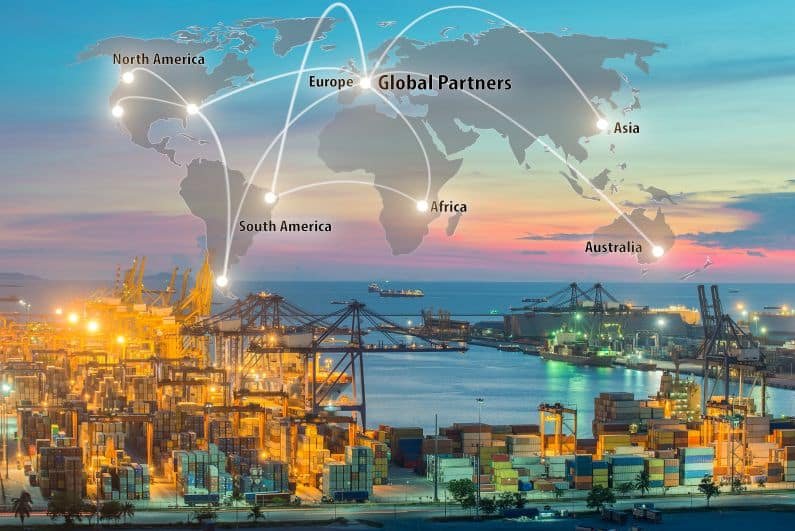Solar energy is becoming increasingly popular as a renewable energy source, an alternative to fossil fuels. From residential rooftops to large solar farms, the demand for solar panels is soaring.
As this market expands globally, the importance of effective shipping and logistics for solar panel distribution has never been more critical.
This article aims to provide a comprehensive guide on the key aspects of shipping solar panels across the globe, from packaging and transportation to compliance and risk management.
The Solar Panel Market
The significance of solar panels in today’s energy landscape cannot be overstated. The solar panel market is experiencing remarkable growth, primarily attributed to the increasing global awareness of environmental issues and the declining costs of photovoltaic (PV) technology. In 2020, an astounding 135 gigawatts (GW) of new solar capacity were installed worldwide, a clear indicator of the industry’s upward trajectory.
Projections indicate that Asia, particularly in China and India, will witness the most rapid expansion in this sector, although Europe and North America are also making steady progress. By 2030, the global solar energy market is anticipated to surpass the $200 billion mark, underscoring its economic significance.
Leading the charge are major players like Tesla, First Solar, and JinkoSolar, but the market’s dynamism and competitiveness are further enhanced by numerous smaller companies contributing to the industry’s innovation and growth. This growth is not just a business opportunity; it represents a pivotal step towards a sustainable and eco-friendly future.
Shipping Solar Panels Internationally
Harnessing the power of solar panels is undeniably essential for sustainable growth and development, both for businesses and society as a whole. However, shipping them globally may have some complications due to their delicate nature and size.
This is where the expertise of a professional shipping company comes into play. Here are some of the regulations and compliance factors to consider when shipping solar panels:
International Shipping Regulations
When shipping solar panels across borders, you need to follow many rules and regulations. These guidelines cover various aspects, including the safety standards concerning potentially dangerous substances.
Since solar panels frequently contain metals such as cadmium, it’s essential to comply with these safety measures.
Import/Export Restrictions
There are certain countries that impose limitations on the import and export of solar panels.
These restrictions are mainly put in place to safeguard the domestic manufacturing industry.
Customs and Tariff Considerations
Customs duties can substantially increase the price of solar panels. The amount of tariffs and taxes imposed differs from one country to another, and these additional expenses must be taken into account when calculating the overall logistics cost.
Packaging Solar Panels for Shipment
When it comes to packaging solar panels for shipment, commonly used materials include foam cushioning, wooden crates, and anti-static bubble wrap. These materials provide a secure environment to protect the panels.
Ensuring the safe storage and transport of solar panels requires temperature-controlled storage facilities and the implementation of anti-shock mechanisms.
By maintaining optimal storage conditions and minimizing the risk of damage during transportation, the panels can be safeguarded effectively.
One case study revealed that using reinforced cardboard with foam inserts reduced damage rates by 20%.
Modes of Transport
Air, Sea, Rail, and Road: Pros and Cons
- Air: Quick but expensive and has a higher carbon footprint.
- Sea: Cost-effective for large shipments but slower.
- Rail: Useful for continental shipping, with moderate speed and cost.
- Road: Most flexible but can be expensive for long distance
Comparative Cost Analysis
When it comes to sending goods, shipping them by sea is usually the cheapest option for large quantities, as it allows for bulk shipments.
On the other hand, if you have smaller packages that need to reach their destination quickly, using air transport might be more cost-effective.
Risk Management
Common Risks in Shipping Solar Panels
Damages, delays, and losses are the primary risks. Solar panels are fragile and sensitive to extreme temperatures.
Strategies for Minimizing Risk
When you use well-known shipping companies, keep track of your shipments as they travel, and make sure you have adequate insurance, you can reduce these risks effectively.
Insurance Options
Cargo insurance for the full value of the shipment is advisable, and some insurers offer specialized coverage for solar panels.
Real-World Case Studies
Companies like Tesla have successfully established complex logistics networks for shipping solar panels.
They have employed multi-modal transport strategies, combining sea, air, and road transport, to minimize costs and maximize efficiency.
Role of Technology in Optimizing Logistics
Advanced software tools can provide real-time tracking, inventory management, and route optimization.
Software Solutions for Tracking and Management
There are various platforms available that assist in simplifying the logistics process, such as SAP Integrated Business Planning (IBP) and Oracle Transportation Management.
These platforms are designed to make the logistics process more efficient and effective. By using them, businesses can optimize their supply chain operations, enhance visibility, and improve overall coordination.
SAP Integrated Business Planning (IBP) and Oracle Transportation Management provide tools and features that enable organizations to better manage their transportation, inventory, and distribution activities.
With their help, businesses can streamline their logistics operations, leading to better productivity and cost savings.
Navigating the Logistics of Shipping Solar Panels
The logistics of shipping solar panels globally are complex but manageable. With the right strategies in place for packaging, transport, and risk management, companies can succeed in this booming market.
As the industry continues to grow, adhering to sustainability practices will become even more critical. The transportation process of shipping solar panels worldwide is detailed and necessary to promote the development of clean energy.
No matter if you’re a producer, distributor, or government authority, comprehending these logistics is vital to thrive in this continuously expanding industry.





